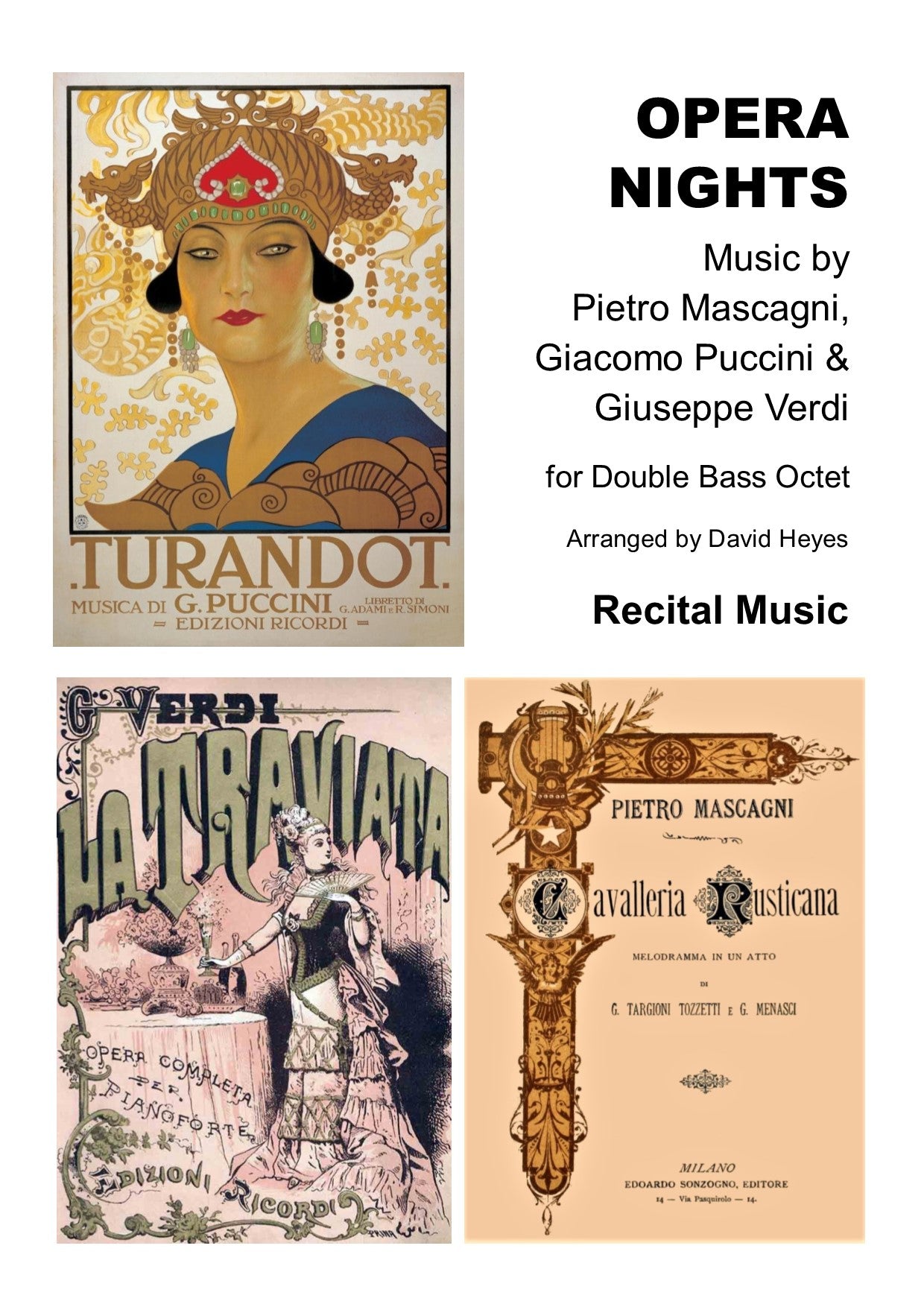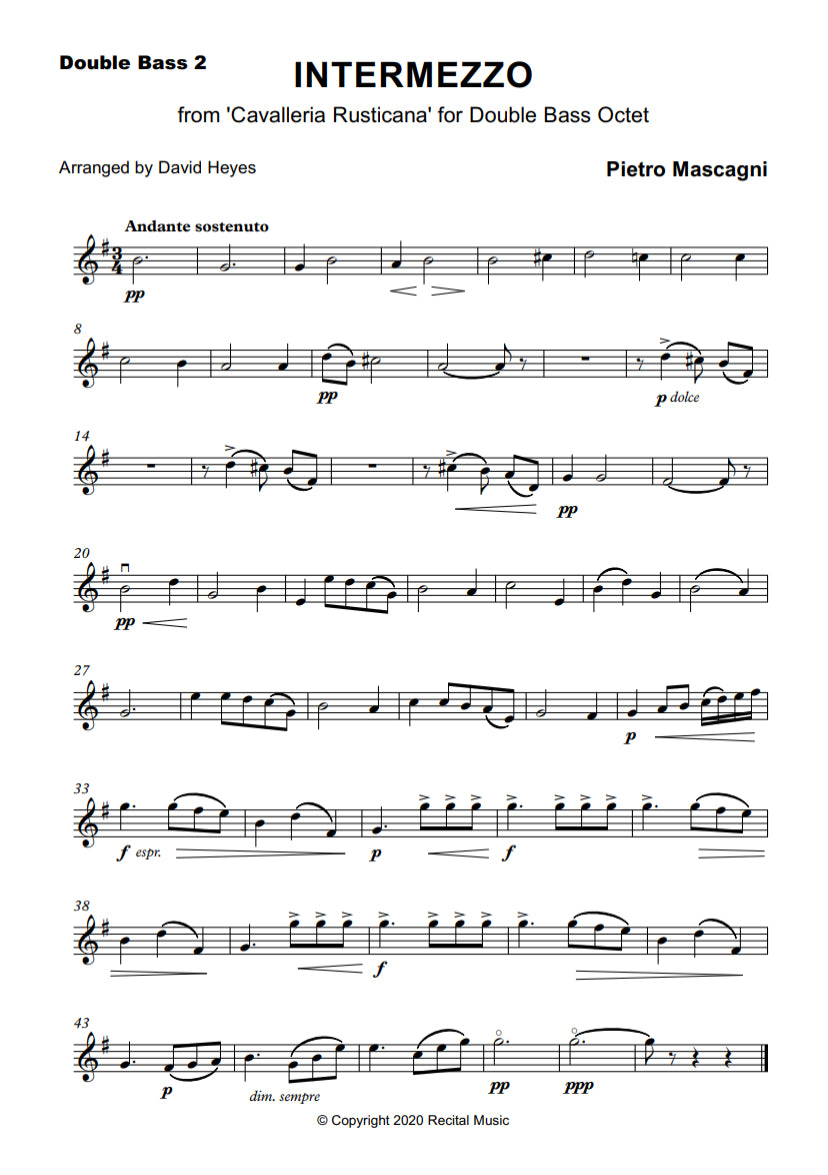David Heyes
Opera Nights: Music by Mascagni, Puccini & Verdi for double bass octet (arranged by David Heyes)
Opera Nights: Music by Mascagni, Puccini & Verdi for double bass octet (arranged by David Heyes)
Couldn't load pickup availability
Verdi Octet
Prelude to Act One of La Traviata by Giuseppe Verdi was transcribed for double bass octet in 2011 by David Heyes and the arrangement was performed in California, USA soon afterwards. In place of an overture, the Act One Prelude sets the scene with an evocative and ethereal introduction before leading into a beautifully sumptuous melody, set against a colourful and engaging accompaniment and a joyfully playful counter-melody. It ends quietly and simply.
The music transcribes well for double bass octet and there are musical, technical and ensemble challenges for each performer.
Giuseppe Verdi (1813-1901) was the leading Italian composer of the second half of the 19th-century and his many operas are still at the heart of the international repertoire into the 21st-century. La Traviata is based on ‘La Dame aux camélias’ (The Lady of the Camellias) by Alexandre Dumas (1802-1870) and its premiere at the Teatro La Fenice in Venice on 6 March 1853 was a failure. Verdi asked after the premiere “La Traviata, last night, a fiasco. Is it my fault, or the singers? Time will show.” Indeed, time has shown what a masterpiece this is and it is one of Verdi’s most beloved operas to this day.
Mascagni Octet
The orchestral Intermezzo is heard between the two scenes of Cavalleria Rusticana’s single act, and evokes the Easter day religious spirit of the opera’s setting. This is the most famous melody in the opera and has been arranged for many instrumental combinations, also used in films including Raging Bull and The Godfather: Part III.
The music is wonderfully evocative and lyrical, emphasising the sonorous character and possibilities of the double bass octet, and this is a crowd pleaser on every occasion.
Pietro Mascagni (1863-1945) was an Italian composer and is known for writing 15 operas. He was successful during his lifetime, as both composer and conductor, and is remembered today for his one-act operatic masterpiece Cavalleria Rusticana, composed in 1890.
"In July 1888 the Milanese music publisher Edoardo Sonzogno announced a competition open to all young Italian composers who had not yet had an opera performed on stage. They were invited to submit a one-act opera which would be judged by a jury of five prominent Italian critics and composers. The best three would be staged in Rome at Sonzogno's expense. Mascagni heard about the competition only two months before the closing date and asked his friend Giovanni Targioni-Tozzetti, a poet and professor of literature at the Italian Royal Naval Academy in Livorno, to provide a libretto. The opera was finally submitted on the last day that entries would be accepted. In all, 73 operas were submitted, and on 5 March 1890, the judges selected the final three: Niccola Spinelli's Labilia, Vincenzo Ferroni's Rudello, and Mascagni's Cavalleria Rusticana."
The opera is now often partnered with Leoncavallo's one-act opera I Pagliacci and the instrumental Intermezzo has developed a life of its own and has been arranged for many different instrumental ensembles. The music is lyrical and dramatic, emphasising the sonorous qualities of the double bass octet, and would be ideal for any audience or occasion.
Puccini Octet
Nessun Dorma is one of the world’s best-loved opera arias which has been performed by the greatest tenors of the last hundred years. Arranged by David Heyes, it has much dramatic potential for the double bass octet with the soaring melody shared between basses 1 and 2.
A rich palette of tone colours can be explored, demonstrating the lyrical and cantabile possibilities of the double bass octet, creating an orchestral palette of accompaniment against which the soloists can 'belt out a good tune.' This has been popular in performance with musical challenges for each player.
Giacomo Puccini (1858-1924) was the most successful Italian opera composer of his generation and his operas are at the very heart of the international repertoire almost a century after his death
Turandot was Giacomo Puccini’s final opera and was left unfinished at the time of his death in 1924, completed two years later by Franco Alfano. It was premiered at La Scala in Milan on 25 April 1926 and has remained in the operatic repertoire to this day.
Who needs an overpaid tenor when eight basses can do the job!









